Elder Bednar Urges Mission Leaders to Seek to Develop “Essential Elements of a Christlike Character”
Contributed By Sarah Jane Weaver, Church News editor
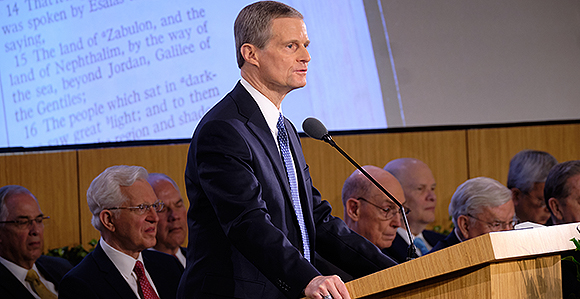
Elder David A. Bednar of the Quorum of the Twelve Apostles speaks during the 2019 Mission Leadership Seminar in the Provo Missionary Training Center on June 27, 2019.
Article Highlights
- We model Christ's character as we increasingly reach outward when our natural tendency is to turn inward.
“Character is demonstrated by looking, turning, and reaching outward when the instinctive response of the natural man in each of us is to turn inward and to be selfish and self-absorbed.” —Elder David A. Bednar
Related Links
PROVO, UTAH
In 1995, Elder David A. Bednar of the Quorum of the Twelve Apostles participated in a training meeting with Elder Neal A. Maxwell. During the course of his instruction, Elder Maxwell made a statement that impressed Elder Bednar deeply. “There would have been no Atonement except for the character of Christ,” Elder Maxwell said.
After returning home, this “penetrating statement” became a primary topic for Elder Bednar’s studying, reflecting, and praying.
During the 2019 Mission Leadership Seminar at the Provo Missionary Training Center on June 25, Elder Bednar recounted: “I read the New Testament and the Book of Mormon repeatedly focusing upon the question, ‘What is the character of Christ?’ I sought to learn more about the word ‘character,’ the relationship between Christ’s character and the Atonement, and the implications of that relationship for each of us as disciples.”
Speaking to 164 couples attending the seminar, Elder Bednar said character refers to “the moral qualities of an individual that are conscientiously and consistently lived.” The word character in the Topical Guide to the scriptures is cross-referenced to the topics of honesty, honor, and integrity, he noted.
In Elder Maxwell’s talk, delivered to Church Educational System educators, Elder Maxwell specifically linked Christ’s character to the infinite and eternal atoning sacrifice, said Elder Bednar. “Jesus’s character necessarily underwrote His remarkable atonement. Without Jesus’s sublime character there could have been no sublime atonement! His character is such that He ‘[suffered] temptations of every kind’ (Alma 7:11), yet He gave temptations ‘no heed’ (Doctrine and Covenants 20:22),” said Elder Bednar, quoting Elder Maxwell’s address “O How Great the Plan of Our God.”
One of the greatest indicators of righteous character “is the capacity to recognize and appropriately respond to other people who are experiencing the very challenge or adversity that is most immediately and forcefully pressing upon us,” said Elder Bednar. “Character is revealed, for example, in the power to discern the suffering of other people when we ourselves are suffering; in the ability to detect the hunger of others when we are hungry; and in the power to reach out and extend compassion for the spiritual agony of others when we are in the midst of our own spiritual distress. Therefore, character is demonstrated by looking, turning, and reaching outward when the instinctive response of the natural man in each of us is to turn inward and to be selfish and self-absorbed.”
The Savior of the world is the source, the standard, and the ultimate criterion of moral character and the perfect example of charity and consistency, said Elder Bednar.
The New Testament, he continued, is replete with “strikingly displayed” examples of the Savior’s character. “The character of Christ, the consistent capacity to turn outward and minister to others in the midst of affliction, is the very foundation of the infinite and eternal atoning sacrifice,” he said.
Jesus, who suffered the most, has the most compassion for those who suffer so much less, said Elder Bednar. As the awful agony of the Crucifixion commenced, the Savior pleaded with the Father to “forgive them; for they know not what they do (Luke 23:34).” While hanging on the cross, Jesus instructed the Apostle John about caring for His mother, Mary (see John 19:26-27). And in the midst of excruciating spiritual and physical pain, the Savior reassured one of the thieves on the cross, “To day shalt thou be with me in paradise” (Luke 23:43).
“Throughout His mortal ministry, and especially during the events leading up to and including the atoning sacrifice, the Savior of the world turned outward—when the natural man or woman in most of us would have focused inward.”
Latter-day Saints can in mortality seek to be blessed with and develop essential elements of a Christlike character, taught Elder Bednar. “Indeed, it is possible for us as mortals to strive in righteousness to receive the spiritual gifts associated with the capacity to reach outward and appropriately respond to other people who are experiencing the very challenge or adversity that is most immediately and forcefully pressing upon us.
“We cannot obtain such a capacity through sheer willpower or personal determination. Rather, we need and are dependent upon ‘the merits, and mercy, and grace of the Holy Messiah’ (2 Nephi 2:8).“
But one can increasingly reach outward when the natural tendency is to turn inward, he said.
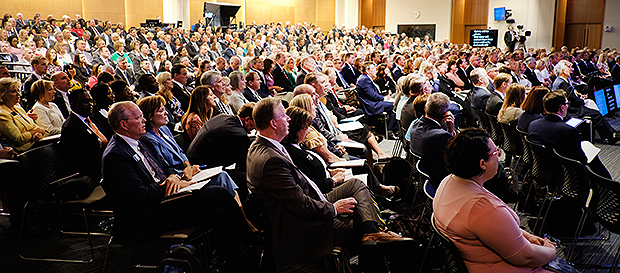
New mission presidents and their companions listen to instruction and counsel from Church leaders during a session of the 2019 Mission Leadership Seminar, which was held June 23–25 at the Provo Missionary Training Center.
While serving as a stake president, Elder Bednar learned of an automobile accident involving three teenage girls from his stake. A dear friend of the Bednars called Elder Bednar and asked if he could go to the hospital, meet the ambulance when it arrived, and assist in identifying two of the young women; the third teen had been pronounced dead at the scene.
During the course of their telephone conversation, Elder Bednar gradually became aware of two important things. First, his friend’s daughter was one of the young women involved in the accident. Second, the mother was using two telephone handsets simultaneously—one pressed to each of her ears. As the woman was talking to Elder Bednar she was also talking to the nurse at a small rural hospital who had initially attended to the three accident victims.
“I then heard one of the most remarkable things I have ever heard in my life. I faintly heard the nurse telling this faithful mother and friend that the young woman pronounced dead at the scene of the accident had been positively identified as her daughter. … Without hesitation, and with a calm and most deliberate voice, our friend next said, ‘President Bednar, we must get in contact with the two other mothers. We must let them know as much as we can about the condition of their daughters and that they will soon be admitted into the hospital.’”
Elder Bednar added, “The Christlike character of this devoted woman was manifested in her immediate and almost instinctive turning outward to attend to the needs of other suffering mothers.”
Elder Bednar drove to the hospital, where he was invited into two different treatment areas to identify the injured young women. Within a relatively short period of time, the two remaining young women died.
“My attention and the attention of the respective families then shifted to funeral arrangements and logistics. A day or so later, in the midst of program planning and detail arranging for the three funerals, I received a phone call from a ward Relief Society president. This faithful woman was a single mother rearing her only child, and that daughter had been one of the victims in the accident. …
“After reviewing and finalizing several details for the funeral of her daughter, this good sister said to me, ‘President, I am sure it was difficult for you to see my daughter in the emergency room the other day. … We are not going to have an open casket at the viewing. I have just returned from the funeral home, and they have helped my daughter to look so lovely again. I was just wondering—why don’t we arrange a time when we can meet at the mortuary and you can have one last look at her before she is buried? Then your final memories of my daughter will not be the images you saw in the emergency room.’”
Elder Bednar said he marveled at the compassion and thoughtfulness this sister had for him. “In this good woman I detected no self-pity and no turning inward. Sorrow, certainly. Sadness, absolutely. Nevertheless, she reached outward when many or perhaps most of us would have turned inward with sorrow and grief.”
Church members appropriately and rightly speak with reverence and awe of the mighty men and women who repeatedly gave their all to establish the Church in the early days of the Restoration, he said.
“I have equal reverence and awe for these two mothers—women of faith and conversion and character—who taught me so much and instinctively reached outward when most of us would have turned inward.”
Like the two stalwart women, “as we do our best to ‘press forward with a steadfastness in Christ, having a perfect brightness of hope, and a love of God and of all men’ (2 Nephi 31:20), then we are blessed to do and to become much more than perhaps we are able to recognize.”
Elder Bednar concluded, “My beloved brothers and sisters, the hour of your mission is come. And you can and you will do what you have been called by Him to do. Because of Him, and with Him, you can do this. In the strength of the Lord, you and we can do all things. I pray the Holy Ghost delivers that message individually to your hearts.”
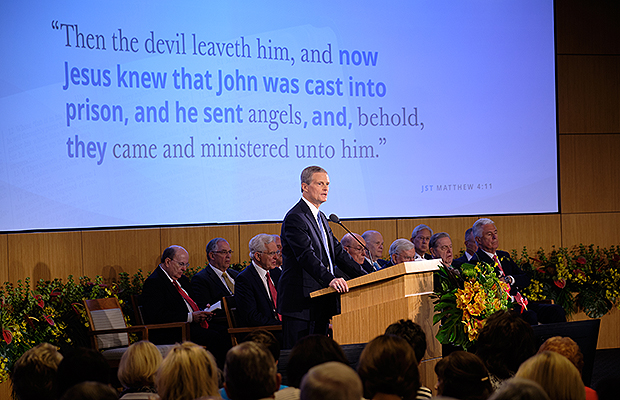
Elder David A. Bednar of the Quorum of the Twelve Apostles speaks during the 2019 Mission Leadership Seminar in the Provo Missionary Training Center on June 27, 2019.
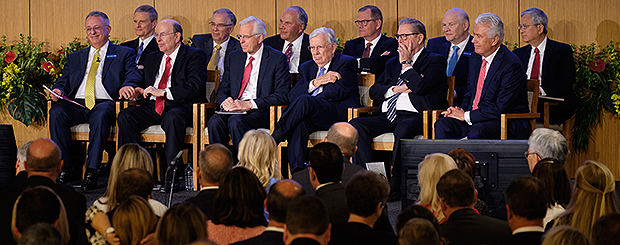
The Quorum of the Twelve Apostles attends the 2019 Mission Leadership Seminar held at the Provo Missionary Training Center in Provo, Utah, June 23–25, 2019.
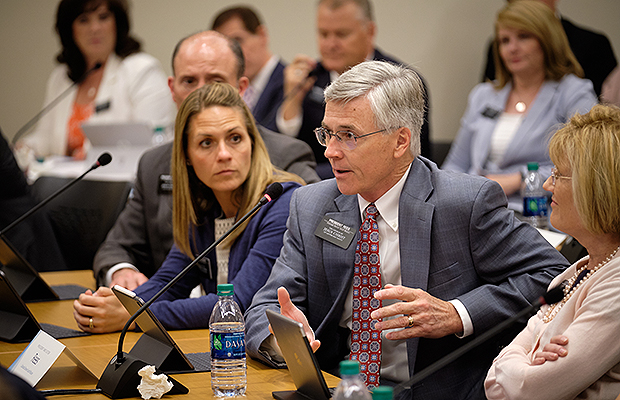
A new mission president gives a comment during a breakout session of the 2019 Mission Leadership Seminar, which was held June 23-25 at the Provo Missionary Training Center.
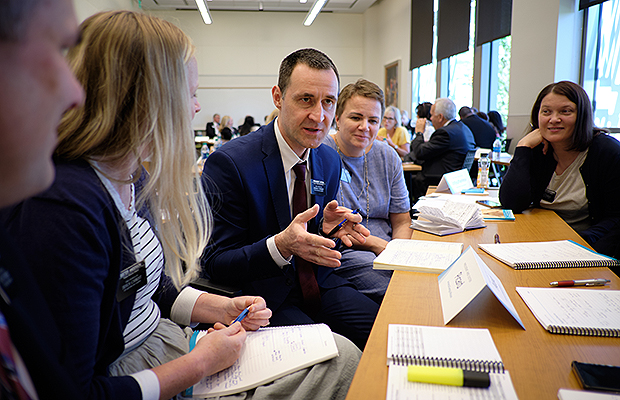
A new mission president gives a comment during a breakout session of the 2019 Mission Leadership Seminar, which was held June 23-25 at the Provo Missionary Training Center.
